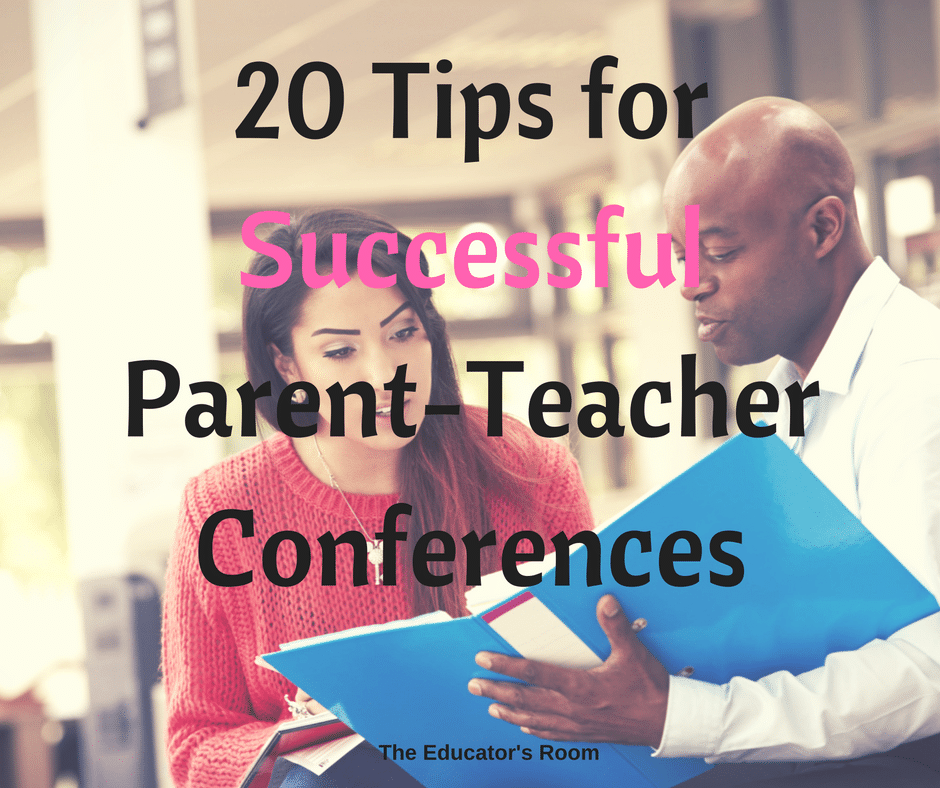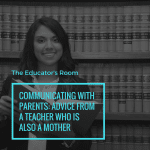For most teachers, November marks two things on our schedules:
- Parent-teacher conferences
- A day of Thanks that they’re over
Let’s get you from point 1 to point 2 with our 20 tips for Parent-Teacher Conferences
PRE-CONFERENCE:
1. Learn your school’s culture regarding that day. The first years I taught at my current school, I conferenced the days that they were on the school calendar. Silly me. Later I learned my colleagues conferenced a few hours after school each day so those days could be traded in for a day off. Similarly, if your team of teachers conferences at the same time, that’s an important thing to know (and establish).
2. Invite all your parents. Simply stated, if you have access to an email blast or Remind app messages, send it. If not, print off an invitation and send it home with students (or mail it home for the not-so-reliable ones).
3. Try to mitigate the “how amazing is my kid?” conferences. Most parents who come to my parent-teacher conferences are involved, and, therefore, curious about their awesome kid. I tell them that’s why their kid is so awesome. However, I focus my time on trying to conference with the parents who matter most – and I reach out to them first and give them first chance at times that work for them.
4. Set your expectations. Tell parents how long the conference will be, where it’ll be, who else will be there, where to wait while you’re with other parents, what you don’t have time to discuss, and so on.
5. Establish whether you want the student involved. Keep in mind, the default is not to bring the child. However, sometimes this minor decision might be a helpful contribution to your conference (especially if both you and parent struggle with the kid). Sometimes it might not.
6. Provide factual data and student work to discuss at the conference. If this turns into a trial, you’re going to want evidence to rest your laurels upon.
7. If you expect problems, bring someone else to the meeting. And if that trial turns into a witch hunt, you better have some witnesses and advocates. On the other hand, if your parents don’t speak English and you need an interpreter, that is some important information to consider.
DURING:
8. Dress the part. I break out my suit on special occasions, and I’d be remiss to not wear my suit when I meet many parents at once. It simply adds a bit more of a positive aura to our esteemed (and often attacked) profession, because, I hate to tell you, the parents are judging you on this.
9. Provide a warm atmosphere. I like to play “Classical Goes Pop” or “80s pop” on my Pandora or Spotify playlists. Our newest student work adorns the room, and the lights are fully on. Additionally, I sit at a table where I can sit at an angle to parents instead of directly across from them. Never sit in your desk.
10. “Positive sandwich” the conference. Start and end the conversation on a positive note. No matter how many times Timmy pinches Tina, how many times Julian forgets to complete his homework, or how many times you’ve caught Emma SnapChatting on her phone, you can’t come out the gate negative. The parents will think more highly of you then thank you for it later.
[bctt tweet=”Start and end the parent teacher conference on a positive note” username=”EducatorsRoom”]
11. Keep the conversation focused on the topic – their child’s success. You’re bound to have a parent who wants to talk about other things. Maybe you’re friends outside of school. Maybe they want to trash the 2016 election or the latest education-related legislation. No matter what it is and how enticing the conversation might be, deflect it and keep it centered on their child. Period.
12. Avoid educational jargon. Ever sit in the dentist’s chair and they start saying something along the lines of “3MOD,” “5DO,” “25MFD – no, wait, those incisors look good.” And you have NO IDEA what they’re saying? When you start spitting out words like “differentiated instruction,” “scaffolding,” “504 Plan,” and, worse, the acronyms (NCLB, IEP, FAPE), that’s what you’re doing to parents.
13. Listen. Put your thoughts aside and simply listen to what the parents are saying. Rephrase it and repeat it back to them. Take notes. Your student’s success is their concern and your job.
14. Answer the parents’ questions to the best of your ability. Sometimes you might not know the answer. Other times, answering it might make you uncomfortable. However, they deserve answers from you.
[bctt tweet=”Your student’s success is their concern and your job” username=”EducatorsRoom”]
15. Set a timer. As soon as parents come in, I remind them that my expectation is the meeting lasts 15 minutes. I build in bathroom breaks for my conferences, so one parent that goes five minutes over could ruin my evening.
16. Give parents some homework. Don’t make it too detailed, but something for them to work on with their child. This should not be prescribed before the meeting, however. Make it an on the spot thought.
POST-CONFERENCE:
17. Send a thank you note. Aliza, my student-teacher last year was amazing at writing thank you notes to people. I realized that was a place where I had to improve. So now I try to send more thank you notes. They’re really simple and yet really mean a lot.
18. If something needs to change, change it. Sometimes you have homework, Mr. or Ms. Educator.
19. Offer future conferences, as needed. Conferences don’t have to end in November.
20. Continue your communication. And neither does the parent contact.
Happy conferences, fellow educators. Just two short weeks until we reach Thanksgiving Break.
Thanks to NEA Curriculum, Harvard Family Research Project, ASCD, and Scholastic Magazine for providing previous articles for me to use as a basis for this one.





